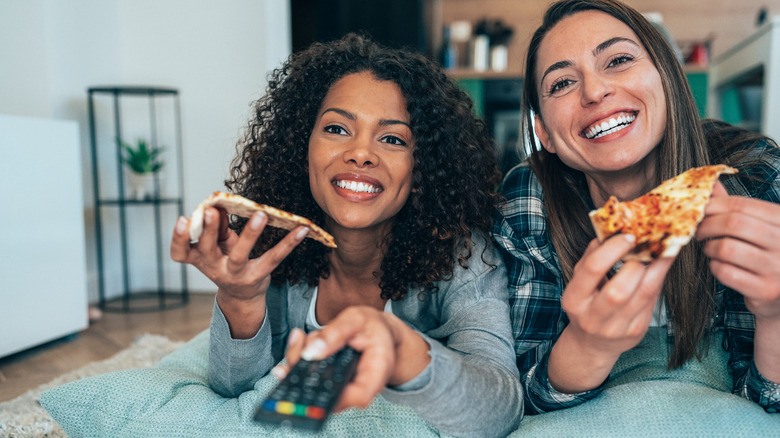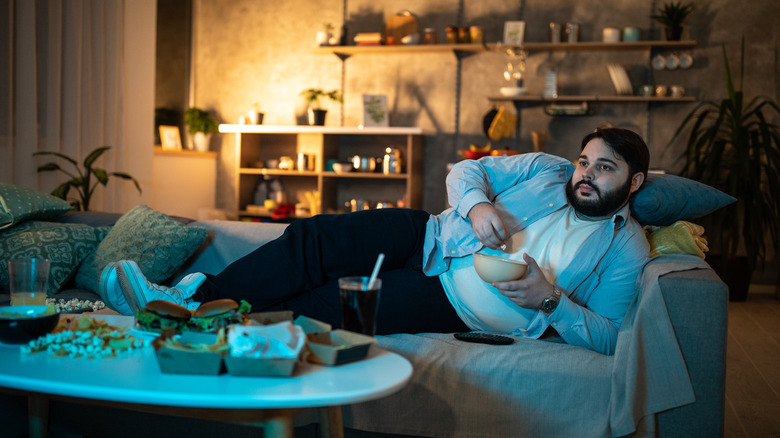What Actually Happens When You Eat While Watching TV
Eating while watching TV is so common and a natural part of our lives that most of us don't even think much about it. We get home after work, take a shower, give our weary heads a few minutes to wind down, and serve up our favorite dinners before we turn on whatever show we've been watching. Or we go in search of our favorite snacks before sitting down to binge-watch "Friends" or "Vikings" on Netflix.
For most people, it's even a form of stress relief because both activities — eating and watching TV — release dopamine in your brain, added clinical psychologist, Dr. Sophie Mort (via Well+Good). It could also be tied to some nuances in American culture — one that associates food as a guilty pleasure that is better done with a distraction and the other built around the notion of being productive and getting two things done at the same time, added Dr. Mort.
But whether you think about it consciously or not, eating while watching TV has negative consequences on your health, according to experts. For one, it's one of those sneaky ways you're eating more calories than you realize. Studies done on the subject have linked watching TV with overeating and even unhealthy food consumption. This isn't all that happens when you're distracting yourself with a device while eating.
You don't enjoy your food as much
It takes mindfulness to relish every bite, focus on what you're consuming, and enjoy the food experience. Watching TV takes away from that. "We tend to eat more mindlessly in front of the TV, We also don't taste and experience the food as much because we're distracted," psychologist Dr. Susan Albers explained to Cleveland Clinic.
Think about the last time you opened a bag of chips and went through the entire thing without realizing you did. Being enthralled by the TV or even social media, can interfere with you noticing hunger cues too, added Dr. Albers. You might not realize that you're satiated and continue eating until you're overly full.
Certified dietitian-nutritionist and author Jaclyn London told Delish that there's another interesting thing that happens when we watch TV and eat, and this has to do with the emotions that arise from what we're watching. If you're watching something that's producing an increase in either positive or negative emotions, this could also lead to overeating. "Trying to sideline or push down those feelings instead of actually letting ourselves feel them can often lead us to other behaviors that feel comforting to us. Namely, eating and drinking," she explained.
How should you be eating?
Some might recommend removing all distractions — TV included — before you sit down to eat, per Life Hack. This can make space for mindful eating. You are likely to lean into your hunger cues — like when you're hungry and when you're full — chew your food better, taste what you're consuming, and aid digestion.
Others say there's no need to completely give up eating with your TV on, especially if this is an important way for you to wind down after a hard day's work. You may want to, implement mindfulness here, too when it comes to the food choices you make before you sit down to eat, how much time you're allotting to eat and sit in front of your TV, and what kind of shows you're watching while you eat. You may want to stop eating sugar while watching TV or bring more than one bowl of popcorn to the TV room when you're sitting down to enjoy your favorite show, shared Dr. Susan Albers, per Cleveland Clinic. Additionally, set a limit to how many episodes you'll watch to prevent overeating for the length of your wind-down TV time.
If these changes aren't helping you stop overeating, you could try eating at the dinner table instead of in front of your TV. You won't know whether or not you'll enjoy the process of mindful eating unless you try it.



